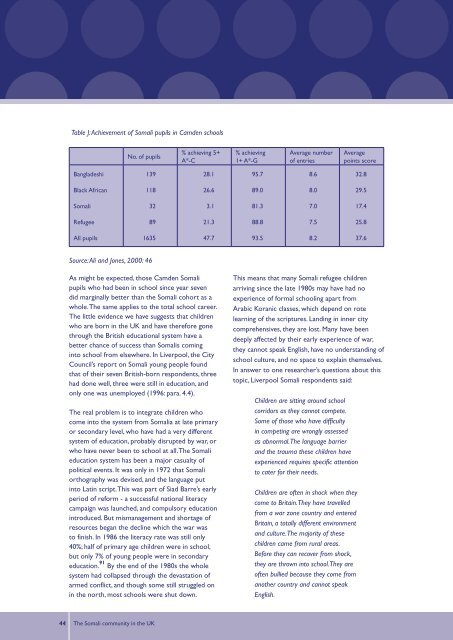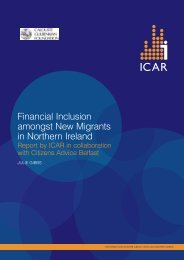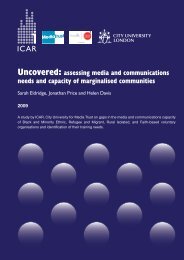The Somali community in the UK: What we know and how we ... - ICAR
The Somali community in the UK: What we know and how we ... - ICAR
The Somali community in the UK: What we know and how we ... - ICAR
You also want an ePaper? Increase the reach of your titles
YUMPU automatically turns print PDFs into web optimized ePapers that Google loves.
Table J: Achievement of <strong>Somali</strong> pupils <strong>in</strong> Camden schools<br />
No. of pupils<br />
% achiev<strong>in</strong>g 5+<br />
A*-C<br />
% achiev<strong>in</strong>g<br />
1+ A*-G<br />
Average number<br />
of entries<br />
Average<br />
po<strong>in</strong>ts score<br />
Bangladeshi<br />
139<br />
28.1<br />
95.7<br />
8.6<br />
32.8<br />
Black African<br />
118<br />
26.6<br />
89.0<br />
8.0<br />
29.5<br />
<strong>Somali</strong><br />
32<br />
3.1<br />
81.3<br />
7.0<br />
17.4<br />
Refugee<br />
89<br />
21.3<br />
88.8<br />
7.5<br />
25.8<br />
All pupils<br />
1635<br />
47.7<br />
93.5<br />
8.2<br />
37.6<br />
Source: Ali <strong>and</strong> Jones, 2000: 46<br />
As might be expected, those Camden <strong>Somali</strong><br />
pupils who had been <strong>in</strong> school s<strong>in</strong>ce year seven<br />
did marg<strong>in</strong>ally better than <strong>the</strong> <strong>Somali</strong> cohort as a<br />
whole. <strong>The</strong> same applies to <strong>the</strong> total school career.<br />
<strong>The</strong> little evidence <strong>we</strong> have suggests that children<br />
who are born <strong>in</strong> <strong>the</strong> <strong>UK</strong> <strong>and</strong> have <strong>the</strong>refore gone<br />
through <strong>the</strong> British educational system have a<br />
better chance of success than <strong>Somali</strong>s com<strong>in</strong>g<br />
<strong>in</strong>to school from elsewhere. In Liverpool, <strong>the</strong> City<br />
Council’s report on <strong>Somali</strong> young people found<br />
that of <strong>the</strong>ir seven British-born respondents, three<br />
had done <strong>we</strong>ll, three <strong>we</strong>re still <strong>in</strong> education, <strong>and</strong><br />
only one was unemployed (1996: para. 4.4).<br />
<strong>The</strong> real problem is to <strong>in</strong>tegrate children who<br />
come <strong>in</strong>to <strong>the</strong> system from <strong>Somali</strong>a at late primary<br />
or secondary level, who have had a very different<br />
system of education, probably disrupted by war, or<br />
who have never been to school at all. <strong>The</strong> <strong>Somali</strong><br />
education system has been a major casualty of<br />
political events. It was only <strong>in</strong> 1972 that <strong>Somali</strong><br />
orthography was devised, <strong>and</strong> <strong>the</strong> language put<br />
<strong>in</strong>to Lat<strong>in</strong> script. This was part of Siad Barre’s early<br />
period of reform - a successful national literacy<br />
campaign was launched, <strong>and</strong> compulsory education<br />
<strong>in</strong>troduced. But mismanagement <strong>and</strong> shortage of<br />
resources began <strong>the</strong> decl<strong>in</strong>e which <strong>the</strong> war was<br />
to f<strong>in</strong>ish. In 1986 <strong>the</strong> literacy rate was still only<br />
40%; half of primary age children <strong>we</strong>re <strong>in</strong> school,<br />
but only 7% of young people <strong>we</strong>re <strong>in</strong> secondary<br />
education. 91 By <strong>the</strong> end of <strong>the</strong> 1980s <strong>the</strong> whole<br />
system had collapsed through <strong>the</strong> devastation of<br />
armed conflict, <strong>and</strong> though some still struggled on<br />
<strong>in</strong> <strong>the</strong> north, most schools <strong>we</strong>re shut down.<br />
This means that many <strong>Somali</strong> refugee children<br />
arriv<strong>in</strong>g s<strong>in</strong>ce <strong>the</strong> late 1980s may have had no<br />
experience of formal school<strong>in</strong>g apart from<br />
Arabic Koranic classes, which depend on rote<br />
learn<strong>in</strong>g of <strong>the</strong> scriptures. L<strong>and</strong><strong>in</strong>g <strong>in</strong> <strong>in</strong>ner city<br />
comprehensives, <strong>the</strong>y are lost. Many have been<br />
deeply affected by <strong>the</strong>ir early experience of war,<br />
<strong>the</strong>y cannot speak English, have no underst<strong>and</strong><strong>in</strong>g of<br />
school culture, <strong>and</strong> no space to expla<strong>in</strong> <strong>the</strong>mselves.<br />
In ans<strong>we</strong>r to one researcher’s questions about this<br />
topic, Liverpool <strong>Somali</strong> respondents said:<br />
Children are sitt<strong>in</strong>g around school<br />
corridors as <strong>the</strong>y cannot compete.<br />
Some of those who have difficulty<br />
<strong>in</strong> compet<strong>in</strong>g are wrongly assessed<br />
as abnormal. <strong>The</strong> language barrier<br />
<strong>and</strong> <strong>the</strong> trauma <strong>the</strong>se children have<br />
experienced requires specific attention<br />
to cater for <strong>the</strong>ir needs.<br />
Children are often <strong>in</strong> shock when <strong>the</strong>y<br />
come to Brita<strong>in</strong>. <strong>The</strong>y have travelled<br />
from a war zone country <strong>and</strong> entered<br />
Brita<strong>in</strong>, a totally different environment<br />
<strong>and</strong> culture. <strong>The</strong> majority of <strong>the</strong>se<br />
children came from rural areas.<br />
Before <strong>the</strong>y can recover from shock,<br />
<strong>the</strong>y are thrown <strong>in</strong>to school. <strong>The</strong>y are<br />
often bullied because <strong>the</strong>y come from<br />
ano<strong>the</strong>r country <strong>and</strong> cannot speak<br />
English.<br />
44 <strong>The</strong> <strong>Somali</strong> <strong>community</strong> <strong>in</strong> <strong>the</strong> <strong>UK</strong>

















